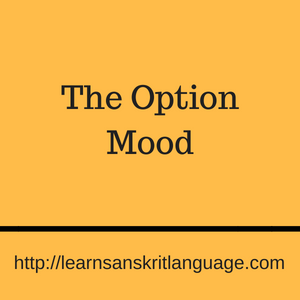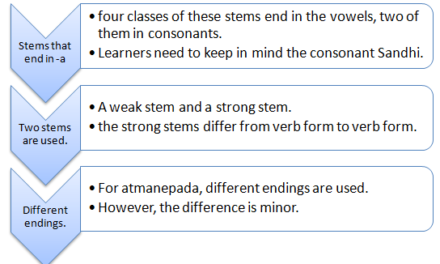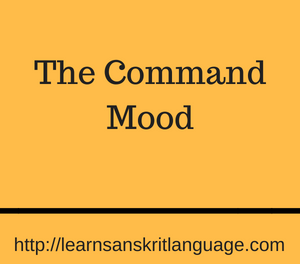An important thing learners must keep in mind about the option mood is that it indicates events or situations which haven’t taken place, and they might or might not happen at all.
Tadā gaccheyam.
Then I should go.
Narā bhāṣeran
The men should speak.
The words which have been underlined are the examples of the verbs which belong to the category of option mood.
Now let us look at how the conjugations, belonging to both the P endings and the A endings. Each category will have two examples and all the examples will be compared with the present tense.
The table below gives the first example of a word with P ending, bhu.
| Singular | Plural | Dual | |
|---|---|---|---|
| Third person | bhavet | bhaveyuḥ | |
| Second person | bhaveḥ | ||
| First person | bhaveyam | bhaveva | bhavema |
Differences:
- It can be noticed that when it comes to the first person, āma changes into īma and āvachanges to īva.
- Another vowel īis added before the endings, this vowel and the vowel a of the stem added and the sound that is produced is e.
- As far as the third person plural is concerned, the difference lies in the use of -īyus.
As for the formation of complex verbs, it is the strong stem that is used.
Now let us look at the other example of a word with P endings. “Su”.
| Singular | Plural | Dual | |
|---|---|---|---|
| Third person | sunuyāt | sunuyāva | |
| Second person | sunuyāḥ | ||
| First person | sunuyām | sunuyāva | sunuyāma |
With this example, two differences can be pointed out, when compared with ordinary past tense:
- Before the ending, ya is attached.
- As far as the third person plural is concerned, -yus is used.
Now let us look at how option mood functions as far as Atmanepada is concerned. The endings in Atamanepada are similar to the ordinary past tense. All of them have the same kind of endings. We shall take the example of labh and Su in this as well.
| Singular | Plural | Dual | |
|---|---|---|---|
| Third person | labheta | labheran | |
| Second person | labhethāḥ | ||
| First person | labheya | labhevahi | labhemahi |
Now we shall look at the example of su.
| Singular | Plural | Dual | |
|---|---|---|---|
| Third person | sunvīta | sunvīran |
|
| Second person | sunvīthāḥ | ||
| First person | sunvīya | sunvīvahi | sunvīmahi |
The difference between these endings and those of past simple verbs are as follows:
Amahi turns into imahi and avahi becomes ivahi.
Before each prefix, ī is attached. However, if there is a vowel in the ending, iy is attached.
As noticed in the table above, the third person plural, uses –iran.




